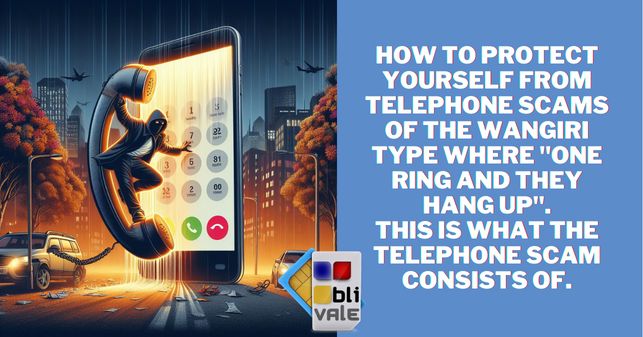Telephone scams represent an increasingly widespread and insidious problem, capable of affecting anyone, without distinction. One of the most common tactics used by scammers is the so-called Wangiri, a deception that entices victims to call back unknown numbers, pushing them to incur exorbitant fees. In this article we will explore in detail what Wangiri scams are, how to defend yourself from them and what actions you can take to protect yourself from these threats.
What are Wangiri scams
Wangiri scams are a type of telephone fraud that is based on sending short calls to random numbers, in order to make the victim's phone ring for just a few seconds, enough to generate curiosity and push the person to call the unknown number back . This trick exploits the natural human tendency to be curious and respond to missed calls, creating an illusion of urgency or importance that leads the victim to make the recall call.
Once the victim calls the number back, they face high rates and hidden costs, determined by the country code of the scam number. The criminals behind these frauds aim to generate quick and easy profits by taking advantage of people's vulnerability and naivety.
How to protect yourself from Wangiri scams
- Avoid calling back unknown numbers. The first rule to defend yourself from telephone scams of the Wangiri type is to avoid calling back unknown numbers, especially if they come from international or unidentifiable prefixes. If you receive a call from a number not saved in your address book, it is advisable not to answer or call back immediately, but to wait for any voice messages or contact the person or company again through official channels.
- Use security apps. There are numerous security apps available for smartphones that can help identify and block unwanted calls, including numbers associated with Wangiri scams. These apps also provide information about users who have reported a number as suspicious, helping protect users from potential threats.
- Report suspicious numbers. If you receive a suspicious call or identify a number associated with a Wangiri scam, it is essential to report the number to the relevant authorities. This allows you to contribute to the prevention of future attacks and the protection of other users.
- Limit sharing of your phone number. To reduce the risk of being a victim of telephone scams, it is advisable to avoid sharing your telephone number on websites, social media or indiscriminately. Limiting the exposure of your phone contact can help maintain your privacy and reduce your chances of being contacted by scammers.
- Keep your smartphone and apps up to date. Finally, to protect yourself from telephone scams and other cyber attacks, it is important to constantly keep your smartphone and the apps installed on it updated. Software updates often include security improvements and new features designed to protect users from potential online threats.
When criminals make money
Wangiri-type phone scams represent a highly profitable business model for the criminals involved, thanks to their automated nature and ability to target a large number of victims at the same time. Even with minimal amounts for each successful call, scammers manage to generate substantial profits, exploiting international dialing codes such as those identified by Interpol: Moldova (+373), Kosovo (+383) and Tunisia (+216), however it is also happening with numbers of countries in Europe and Africa.
The complexity in combating these scams lies in the difficulty of identifying and tracing the numbers used by criminals, often disguised or randomly generated. However, with increased awareness and taking the preventative measures described in this article, you can significantly reduce your risk of falling victim to Wangiri-type phone scams.
Protecting your privacy and security online is imperative in today's digital society, and knowing the tricks used by scammers is the first step in protecting yourself from such threats. By being prudent and taking appropriate preventative measures, you can minimize the risk of being a victim of toll fraud and protect yourself and your family from potential financial harm and privacy violations.









